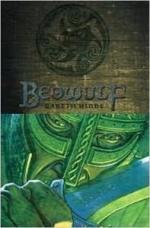ERST.—Formerly.
ERST-WORTHY.—Worthy for a long time past.
FAIN.—Glad.
FERRY.—Bear, carry.
FEY.—Fated, doomed.
FLOAT.—Vessel, ship.
FOIN.—To lunge (Shaks.).
GLORY OF KINGS.—God.
GREWSOME.—Cruel, fierce.
HEFT.—Handle, hilt; used by synecdoche for ‘sword.’
HELM.—Helmet, protector.
HENCHMAN.—Retainer, vassal.
HIGHT.—Am (was) named.
HOLM.—Ocean, curved surface of the sea.
HIMSEEMED.—(It) seemed to him.
LIEF.—Dear, valued.
MERE.—Sea; in compounds, ‘mere-ways,’ ‘mere-currents,’ etc.
MICKLE.—Much.
NATHLESS.—Nevertheless.
NAZE.—Edge (nose).
NESS.—Edge.
NICKER.—Sea-beast.
QUIT, QUITE.—Requite.
RATHE.—Quickly.
REAVE.—Bereave, deprive.
SAIL-ROAD.—Sea.
SETTLE.—Seat, bench.
SKINKER.—One who pours.
SOOTHLY.—Truly.
SWINGE.—Stroke, blow.
TARGE, TARGET.—Shield.
THROUGHLY.—Thoroughly.
TOLD.—Counted.
UNCANNY.—Ill-featured, grizzly.
UNNETHE.—Difficult.
WAR-SPEED.—Success in war.
WEB.—Tapestry (that which is ’woven’).
WEEDED.—Clad (cf. widow’s weeds).
WEEN.—Suppose, imagine.
WEIRD.—Fate, Providence.
WHILOM.—At times, formerly, often.
WIELDER.—Ruler. Often used of God;
also in compounds, as ’Wielder of
Glory,’ ‘Wielder of Worship.’
WIGHT.—Creature.
WOLD.—Plane, extended surface.
WOT.—Knows.
YOUNKER.—Youth.
[1]
BEOWULF.
I.
THE LIFE AND DEATH OF SCYLD.
{The famous race of Spear-Danes.}
Lo!
the Spear-Danes’ glory through splendid achievements
The
folk-kings’ former fame we have heard of,
How
princes displayed then their prowess-in-battle.
{Scyld, their mighty king, in honor of whom they are often called Scyldings. He is the great-grandfather of Hrothgar, so prominent in the poem.}
Oft
Scyld the Scefing from scathers in numbers
5
From many a people their mead-benches tore.
Since
first he found him friendless and wretched,
The
earl had had terror: comfort he got for it,
Waxed
’neath the welkin, world-honor gained,
Till
all his neighbors o’er sea were compelled to
10 Bow to
his bidding and bring him their tribute:
An
excellent atheling! After was borne him
{A son is born to him, who receives the name of Beowulf—a name afterwards made so famous by the hero of the poem.}




